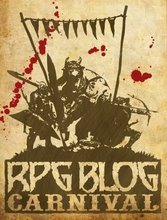 Roleplaying is a group activity and only when every member of a group is firing on all cylinders will the game really fly. But how do you do it? How can you inspire tabletop gamers to put their heart & soul into an RPG?
Roleplaying is a group activity and only when every member of a group is firing on all cylinders will the game really fly. But how do you do it? How can you inspire tabletop gamers to put their heart & soul into an RPG?
Here are five tips for inspiring your role-players, as part of this month’s RPG Blog Carnival.
1. Say yes, not all the time but most of the time.
Everyone has had a great idea which a GM or boss has poo-pooed. We all know what it is like to have our confidence and enthusiasm damaged by rejection. So don’t do it to your players. Say yes when your player asks “Can I …” or when your player says “I want my character to be a …”. Sometimes you will need to say no but most of the time a GM can and should say yes.
2. Reward the right behaviour
When a player is enthusiastic and engaged with your game, reward them with praise, comment on their characterisation and let the other players see and hear you do it. If you don’t show your gratitude when a player is inspired, you cannot expect them to do it again.
3. Reward the right behaviour (again)
Lots of player behaviour, like being late, interrupting other players or being disorganised can spoil a game even if the GM is doing everything right. Reward players with good manners – arriving on time and patiently waiting their turn – with small in-game benefits, e.g. when a player interrupts the GM, everyone else gets 25 XP. The player who arrives exactly on time gets to reroll one dice during the session. Be imaginative in your rewards and make it explicitly clear why you are giving them out.
4. Create space for the players to create
Roleplaying is a creative activity for players and GMs so don’t limit your group’s creativity. Allow room in your game world or adventure for players to create their own background or choose their own route through the dungeon. If everywhere is mapped (literally and metaphorically) there is no space for the players to add their own ideas. Leave blank spaces on your map, in your adventure and in your game setting.
5. Raise your game
To lead, you must set an example to follow which means if you want your players to put more into the game, you must also put more into the game. But not just anywhere. If you already do 10 hours of prep, doing 11 hours won’t be noticed. Instead, find your weak spots and make the effort to improve them. This will make you a better GM and your players will see you the effort you are making and be more willing to make the effort themselves.
Photo Credit: U.S. Army

